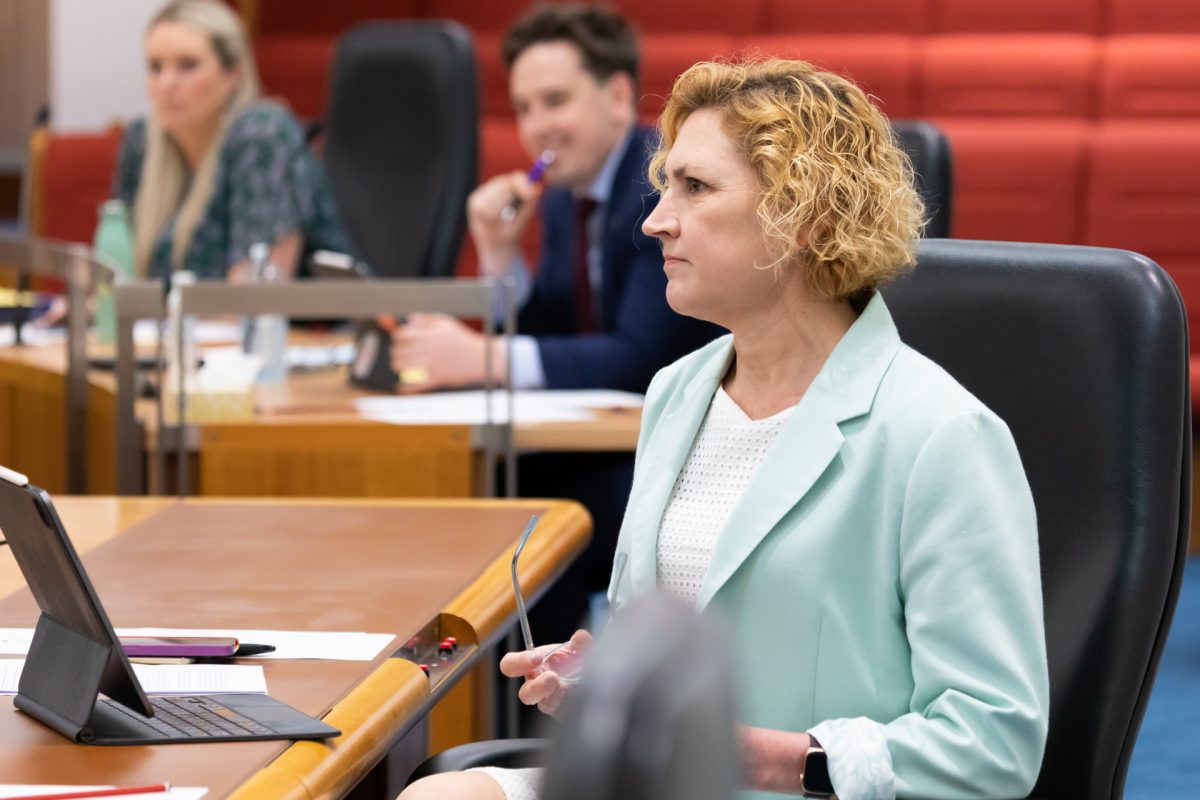
The report investigated poor working conditions in the office of Greens Minister Emma Davidson. Photo: Michelle Kroll.
A review of the office of Greens Minister Emma Davidson has revealed a toxic and dysfunctional workplace marked by high staff turnover, backbiting, complaints being ignored and communication breakdowns.
Greens Leader Shane Rattenbury and Chief Minister Andrew Barr initiated the review, conducted by consultancy Proximity after complaints were made about the working conditions and conduct of the office.
Proximity was engaged in July last year and submitted its report in October, but it has only just been made public.
Reports began emerging last year that all was not well in Ms Davidson’s office, but details were sketchy and could not be confirmed.
The Proximity report found the office suffered from a lack of leadership and had been poorly established but refrained from outright criticism of the Minister.
Inappropriate behaviour and statements, often in front of people, went unchecked, staff were resentful about how people were hired and how much they were paid. For some, the conflict became unbearable and they left.
One former employee was branded as disloyal and another was said to have been fired when they had actually resigned.
“Ineffective communication (and sometimes the lack of consultation) had generated misinformation and uncertainty about roles, reasons for staff changes and reluctance to clarify information and actions taken by decision-makers,” the report said.
There was no effective complaints process, but when concerns were raised about inappropriate behaviours, the complainants felt there was no effective organisational response.
“A more transparent and supported approach (eg what to do, where to go and knowing the outcome of any complaint or incident reported) is considered necessary to address complaints and manage disputes,” the report said.
“Some of the Review respondents said this could have alleviated the stresses experienced in the early days in the office.”
The report said that when it came to health and safety at the Assembly, there was little emphasis on mental health and psychological stress, which for Ms Davidson’s staff is ironic given she is the Minister for Mental Health, and some of the subject material can be challenging.
The report attributed many of the problems to inexperience, a lack of guidance about how the office should run and no processes and mechanisms to establish clear work expectations and procedures in a high-pressure environment.
It found the office was established in a piecemeal and hurried way.
“In the first 18 months, the office experienced high levels of staff turnover and a lack of clarity around performance expectations, processes and accountabilities,” the report said.
“Feedback indicated some staff felt unsupported and vulnerable – working in what was a newly formed, high-pressure and new parliamentary environment.”
Staff who made the move from campaign mode to government found limited education, induction and training about the nature and expectations of their new ‘ministerial adviser’ roles.
“Importantly, there was little clarity of their accountabilities through, for example, performance agreements to support the Minister,” the report said.
“The professional development of the Minister’s staff does not appear to have been encouraged or formally supported: former staff described the pace of work and lack of direction and constructive feedback as not allowing time for on-the-job training or other development opportunities.”
The report said changes had been made within the office to strengthen leadership, build team performance and support the well-being of staff.
These included regular team meetings, improved diary and meeting management for the Minister, and a Minister’s office planning session to clarify and allocate portfolio responsibilities to ministerial advisers.
Also in train were a complaints escalation process, exit interviews and more transparent recruitment processes.
The report made six recommendations that it believed should also be extended to Ministerial offices generally at the Assembly.
These covered the need for contemporary workplace materials, greater clarity of roles and expectations, strengthening team approaches, an effective complaints process, workplace safety and regular progress reviews.
Ms Davidson said the Chief Minister and Mr Rattenbury had accepted the six recommendations and were jointly implementing a response that was being progressively rolled out across all Labor and Greens’ Ministerial offices.
Ms Davidson further noted the challenge of establishing her office and ministerial functions during the pandemic.
“I was a newly elected MLA holding responsibility for multiple health-related and essential portfolios that were particularly impacted by the spread of COVID and lockdowns,” she said.
“We all worked very hard to support our community. As you can imagine, it was quite a stressful time for all of us and I acknowledge that this, combined with a lack of established processes, led to some teething issues.
“As an organisation that has been through rapid growth, setting up multiple new offices, it would be expected that there are structures and processes that needed to change. ACT Greens in the Assembly have already put in place some of those changes and are working on others, and working with the Assembly on better processes for all Assembly staff.”
The Proximity report draws on similar reviews of parliamentary workplaces across Australia, including Sex Discrimination Commissioner Kate Jenkins’ Set the Standard report and Elizabeth Broderick’s Independent Review into bullying, harassment and sexual misconduct at the Parliament of NSW.





















